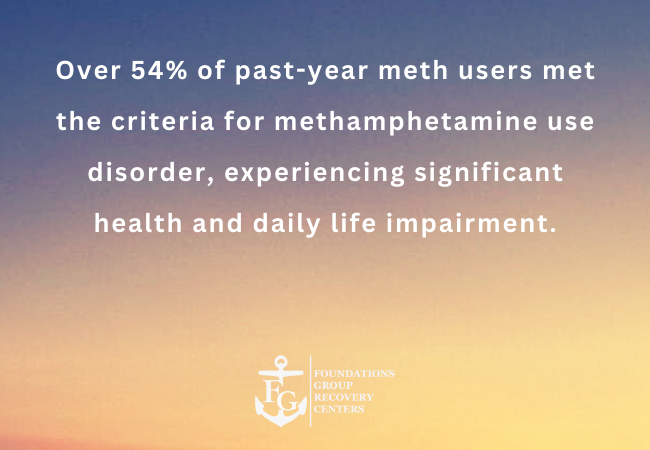Methamphetamine addiction is a severe and rapidly growing public health crisis in the United States. Known commonly as meth, crystal meth, or ice, this highly addictive stimulant alters brain chemistry, leading to compulsive drug-seeking behaviors and devastating health consequences.
Meth use has surged in recent years, with nearly 2.5 million people in the U.S. reporting methamphetamine use in the past year. Many individuals battling meth addiction experience severe withdrawal symptoms, long-term cognitive impairment, and an increased risk of overdose.
At Foundations Group Recovery Centers, we offer comprehensive Meth Addiction Treatment in Massachusetts, including Day Treatment Programs, Outpatient Addiction Treatment, and Half-Day Treatment Programs designed to help individuals overcome meth addiction and reclaim their lives.
This guide explores:
- What methamphetamine is and how it affects the brain and body
- The primary causes of meth addiction
- The signs and symptoms of methamphetamine addiction
- The long-term effects of meth abuse
- Effective treatment options for meth addiction
- New Section: The Role of Family in Meth Recovery
What Is Methamphetamine?
Methamphetamine is a potent central nervous system stimulant that rapidly increases dopamine levels in the brain, leading to an intense sense of euphoria. However, its effects are short-lived and highly addictive, often leading to binge use and dependence.
How Meth Affects the Brain
Methamphetamine disrupts normal brain function by:
- Flooding the brain with dopamine, reinforcing compulsive drug use.
- Destroying dopamine receptors, making it difficult to feel pleasure naturally.
- Causing severe cognitive impairment, including memory loss, paranoia, and aggression.
Forms of Methamphetamine
Meth comes in different forms, including:
- Crystal Meth: A smokable form that resembles glass shards.
- Powdered Meth: Can be snorted, injected, or swallowed.
- Pills: Often misused as a prescription stimulant.
Regardless of the form, meth is highly addictive and can quickly lead to long-term dependency.
What Causes Meth Addiction?
Meth addiction develops from a combination of biological, psychological, and environmental factors.
1. Genetic and Biological Factors
- Individuals with a family history of substance use disorders may have a higher risk of addiction.
- Methamphetamine alters brain chemistry, leading to physical dependence.
2. Psychological and Mental Health Disorders
- People suffering from depression, PTSD, or anxiety may turn to meth as a way to self-medicate.
- Meth’s initial euphoric effects provide temporary relief from emotional pain, reinforcing addiction.
3. Environmental and Social Influences
- Exposure to drug use at an early age increases the risk of meth addiction.
- Peer pressure and social normalization of drug use encourage meth experimentation.
- Stressful life situations or trauma may contribute to substance abuse.
4. High Availability and Low Cost
- Meth is inexpensive and widely available, making it a popular drug of choice.
- The powerful and immediate high causes rapid addiction and repeated use.
Recognizing the Symptoms of Meth Addiction
Physical Symptoms
- Extreme weight loss due to appetite suppression.
- Severe dental issues (“meth mouth”), including rotting teeth and gum disease.
- Skin sores and infections from excessive scratching.
- Intense bursts of energy followed by extreme exhaustion.
- Irregular heartbeat, high blood pressure, and increased body temperature.
Behavioral and Psychological Symptoms
- Obsessive drug-seeking behavior, often leading to job loss or financial struggles.
- Paranoia, hallucinations, and aggressive behavior.
- Isolation from friends and family.
- Increased risk-taking behaviors, including unsafe sex and criminal activity.
Signs of Chronic Meth Use
Long-term meth use results in:
- Memory loss and impaired decision-making.
- Severe anxiety and panic attacks.
- Depression and suicidal thoughts.
- Psychosis, resembling symptoms of schizophrenia.
If you or a loved one exhibits these symptoms, immediate professional intervention is essential.
The Long-Term Effects of Meth Addiction
1. Brain Damage and Cognitive Decline
- Meth destroys gray matter, reducing cognitive function.
- Individuals experience memory impairment and permanent damage to decision-making abilities.
2. Severe Mental Health Disorders
- Chronic meth use leads to paranoia, hallucinations, and psychotic episodes.
- Individuals are at high risk for severe depression and suicidal thoughts.
3. Physical Health Consequences
- Increased risk of heart attack and stroke.
- Weakened immune system, leading to frequent infections.
- Extreme weight loss and malnutrition.
4. Relationship and Social Consequences
- Strained family relationships and broken friendships.
- Involvement in crime, homelessness, and financial struggles.
- Difficulty maintaining employment and responsibilities.
The Role of Family in Meth Recovery
1. The Importance of Family Support
Recovery is more successful when family members are involved in the treatment process. Families provide:
- Emotional encouragement and accountability.
- A safe and stable home environment.
- Education on addiction and recovery strategies.
2. Family Therapy and Education
- Therapists work with families to help rebuild trust and communication.
- Educational sessions provide insight into addiction as a disease.
3. Creating a Drug-Free Home Environment
- Remove triggers and ensure meth is not accessible.
- Encourage healthy habits and structured daily routines.
- Participate in family counseling sessions to foster a supportive environment.
A strong family support system significantly increases the chances of long-term sobriety.
Treatment Options for Meth Addiction
At Foundations Group Recovery Centers, we offer a range of evidence-based treatment options:
1. Day Treatment Programs in Massachusetts
- Intensive, structured care without full-time residency.
- Includes behavioral therapy, relapse prevention, and peer support.
2. Outpatient Addiction Treatment in Massachusetts
- Flexible treatment for those balancing work or school.
- Focuses on long-term recovery planning and relapse prevention.
3. Half-Day Treatment Programs
- Transitional care from intensive treatment to outpatient support.
- Helps individuals maintain stability while reintegrating into daily life.
4. Behavioral Therapy and Counseling
- Cognitive-Behavioral Therapy (CBT) to reframe negative thought patterns.
- Motivational Interviewing (MI) to encourage goal-setting and commitment.
- Family and group therapy for ongoing support.
5. Relapse Prevention and Aftercare
- Sober living programs and alumni networks for continued support.
- Ongoing therapy sessions to reinforce sobriety skills.

Why Choose Foundations Group Recovery Centers for Meth Addiction Treatment?
At Foundations Group Recovery Centers, we understand that methamphetamine addiction is a complex and deeply challenging condition. Our evidence-based treatment programs are designed to provide the highest level of care, focusing on long-term recovery, relapse prevention, and holistic healing.
What Sets Us Apart?
1. Individualized Treatment Plans
Every person’s journey to recovery is unique. We develop personalized treatment plans tailored to individual needs, mental health concerns, and personal goals.
2. A Full Continuum of Care
We offer a range of treatment programs to meet patients at different stages of recovery, including:
- Day Treatment Programs in Massachusetts for structured, intensive therapy without full-time residential care.
- Half-Day Treatment Programs, providing continued support while transitioning to independence.
- Outpatient Addiction Treatment, allowing individuals to receive care while maintaining work, school, or family responsibilities.
3. Expert Medical and Clinical Staff
Our team consists of licensed addiction specialists, therapists, and medical professionals who provide expert care, behavioral therapy, and medication-assisted treatment (MAT) when necessary.
4. Evidence-Based Treatment Methods
We use proven therapies to help individuals understand and overcome addiction, including:
- Cognitive-Behavioral Therapy (CBT) to change destructive thought patterns.
- Motivational Interviewing (MI) to encourage commitment to recovery.
- Group and Family Therapy to rebuild relationships and strengthen support systems.
5. Holistic Approach to Recovery
We believe in treating the whole person, not just the addiction. Our holistic approach includes:
- Mindfulness and stress management techniques.
- Nutritional guidance and physical wellness programs.
- Creative therapies, meditation, and recreational activities.
6. Relapse Prevention and Aftercare Support
Long-term recovery requires ongoing support. We provide:
- Structured relapse prevention planning to help individuals navigate triggers.
- Access to sober living programs and alumni networks.
- Continued therapy and peer support groups to reinforce sobriety skills.
Conclusion
Methamphetamine addiction is a devastating condition, but recovery is possible with the right support and treatment. Seeking help is the most critical first step in regaining control, improving health, and rebuilding relationships.
At Foundations Group Recovery Centers, we are committed to helping individuals break free from addiction and regain a sense of purpose, stability, and happiness. If you or a loved one is struggling with meth addiction, don’t wait. Professional treatment can save lives. Call Us Today at 844.763.4966 to Learn More About Our Meth Addiction Treatment Programs in Massachusetts. Your journey to recovery starts now. Let us help you take the first step.
FAQ on Methamphetamine Addiction
What is methamphetamine addiction?
Methamphetamine addiction is a chronic and progressive substance use disorder where individuals develop a physical and psychological dependence on meth. It leads to compulsive drug-seeking behavior, cognitive impairment, and severe health consequences.
What causes methamphetamine addiction?
Meth addiction is influenced by biological, psychological, and environmental factors, including:
- Genetics and brain chemistry that increase susceptibility to addiction.
- Mental health conditions such as depression, anxiety, or PTSD.
- Environmental factors such as peer pressure, trauma, or early drug exposure.
- High availability and low cost, making meth an accessible drug of choice.
What are the symptoms of meth addiction?
Common symptoms include:
- Physical: Extreme weight loss, severe dental problems (“meth mouth”), skin sores, and rapid heart rate.
- Behavioral: Obsessive drug-seeking, aggression, paranoia, and hallucinations.
- Cognitive: Memory loss, impaired judgment, and confusion.
How does methamphetamine affect the brain?
Meth increases dopamine levels, causing intense euphoria. Long-term use leads to:
- Dopamine receptor damage, making it difficult to feel pleasure naturally.
- Cognitive decline, including impaired memory and problem-solving abilities.
- Psychotic symptoms, such as paranoia and hallucinations.
What are the long-term effects of meth addiction?
Chronic meth use can cause:
- Severe mental health disorders, including depression and psychosis.
- Irreversible brain damage, leading to cognitive impairment.
- Cardiovascular issues, including heart attacks and stroke.
- Legal and social consequences, including job loss, homelessness, and incarceration.

